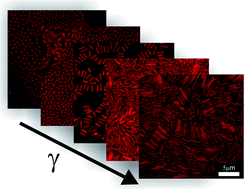Prolate model colloids with defined properties can be obtained by the stretching of spherical polymeric particles, which is well-known for polystyrene and poly(methyl methacrylate) latices. The present study aims to extend this approach to functional core–shell particles in order to achieve a new class of anisotropic colloidal materials where both the aspect ratio and the effective volume fraction can be controlled by temperature. We describe the synthesis and characterization of these functional anisotropic core–shell particles consisting of a polystyrene (PS) core onto which a crosslinked thermoresponsive microgel shell of poly(N-isopropylmethacrylamide) (PNIPMAm) was grafted. Embedded into a film of polyvinylalcohol (PVA), the spherical composite microgels are heated above the glass transition temperature (Tg) of the polystyrene core and then stretched with different deformations γ. During the stretching, the particles adopt an elongated shape, that they retain after cooling to room temperature as confirmed by small-angle X-ray scattering performed on the films. Anisotropic composite microgels with aspect ratios ranging from 2.2 to 6.5 are recovered after dissolution of the PVA and purification, and are fully characterized by diverse methods such as transmission electron microscopy, confocal microscopy and light scattering. The temperature sensitivity of these anisotropic composite microgels is maintained as confirmed by dynamic light scattering and cryogenic electron microscopy performed below and above the volume phase transition of the shell.

You have access to this article
 Please wait while we load your content...
Something went wrong. Try again?
Please wait while we load your content...
Something went wrong. Try again?


 Please wait while we load your content...
Please wait while we load your content...